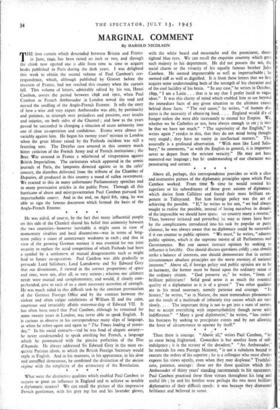MARGINAL COMMENT
By HAROLD NICOLSON
THE iron curtain which descended between Britain and France in June, 1940, has been raised an inch or two, and through the chink now opened one is able from time to time to acquire
books published in Paris during the dark years. I was delighted this week to obtain the second volume of Paul Cambon's cor- respondence, which, although published by Grasset before the invasion of France, had not reached this country when the curtain fell. This volume of letters, admirably edited by his son, Henri Cambon, covers the period between 1898 and 1911, when Paul Cambon as French Ambassador in London sowed the seed and nursed the seedling of the Anglo-French Entente. It tells the story of how a wise and very expert Ambassador was able, by pertinacity and patience, to triumph over prejudices and passions, over insults and injuries, on both sides of the Channel ; and how as the years passed he succeeded in changing a situation of acute animosity into one of close co-operation and confidence. Events were almost in- variably against him. He began his twenty years' mission to London when the great blister raised by the Fashoda incident was still a festering sore. The Dreyfus case aroused in this country much bitter criticism of the French Army and of French institutions ; the Boer War aroused in France a whirlwind of vituperation against British Imperialism. The caricatures which appeared in the comic journals of Paris, the lampoons directed against us in the cafés' concert, the diatribes delivered from the tribune of the Chamber of Deputies, all produced in this country a mood of sullen resentment. We reacted to this in many unfortunate Parliamentary speeches and in many provocative articles in the public Press. Through all this hurricane of abuse and misrepresentation Paul Cambon pursued his imperturbable course. And in the end, on April 8th, 1904, he was able to sign the famous document which formed the basis of the Anglo-French Entente.
* * * *


























 Previous page
Previous page